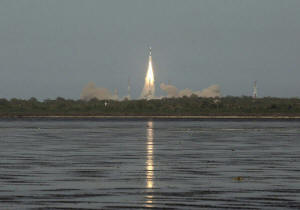|
Prime Minister
Narendra Modi, who came to office promising to strengthen ties
with neighbors such as Sri Lanka, Nepal and even Pakistan, has
called the satellite a gift to south Asia.
"The successful launch of South Asia Satellite is a historic
moment. It opens up new horizons of engagement," he said soon
after an Indian-made rocket carrying the satellite lifted off
from the Sriharikota space center in southern India.
So far Afghanistan, Bangladesh, Bhutan, Nepal, Sri Lanka and the
Maldives have signed up to make use of the satellite. Pakistan
said it was working on its own satellite and did not join.
The South Asia Satellite will offer participating countries
television services and communications technology for bank ATMs
and e-governance, and may even serve as a backup for cellular
networks, especially in places where the terrestrial
connectivity is weak, the Indian foreign ministry said.
India is trying to push back against China's expanding
involvement in infrastructure building across south Asia, by
offering financial and technical aid of its own.
Modi said the leaders of the participating countries had joined
him in a video conference to mark the launch.
Ties with Pakistan remain difficult, with the Indian government
this week accusing Pakistan of killing and then mutilating the
bodies of two soldiers on patrol on the disputed Kashmir border,
provoking calls for retribution. Pakistan denied the accusation.
(Reporting by Sanjeev Miglani; Editing by Mark Trevelyan)
[© 2017 Thomson Reuters. All rights
reserved.] Copyright 2017 Reuters. All rights reserved. This material may not be published,
broadcast, rewritten or redistributed.
|
|






